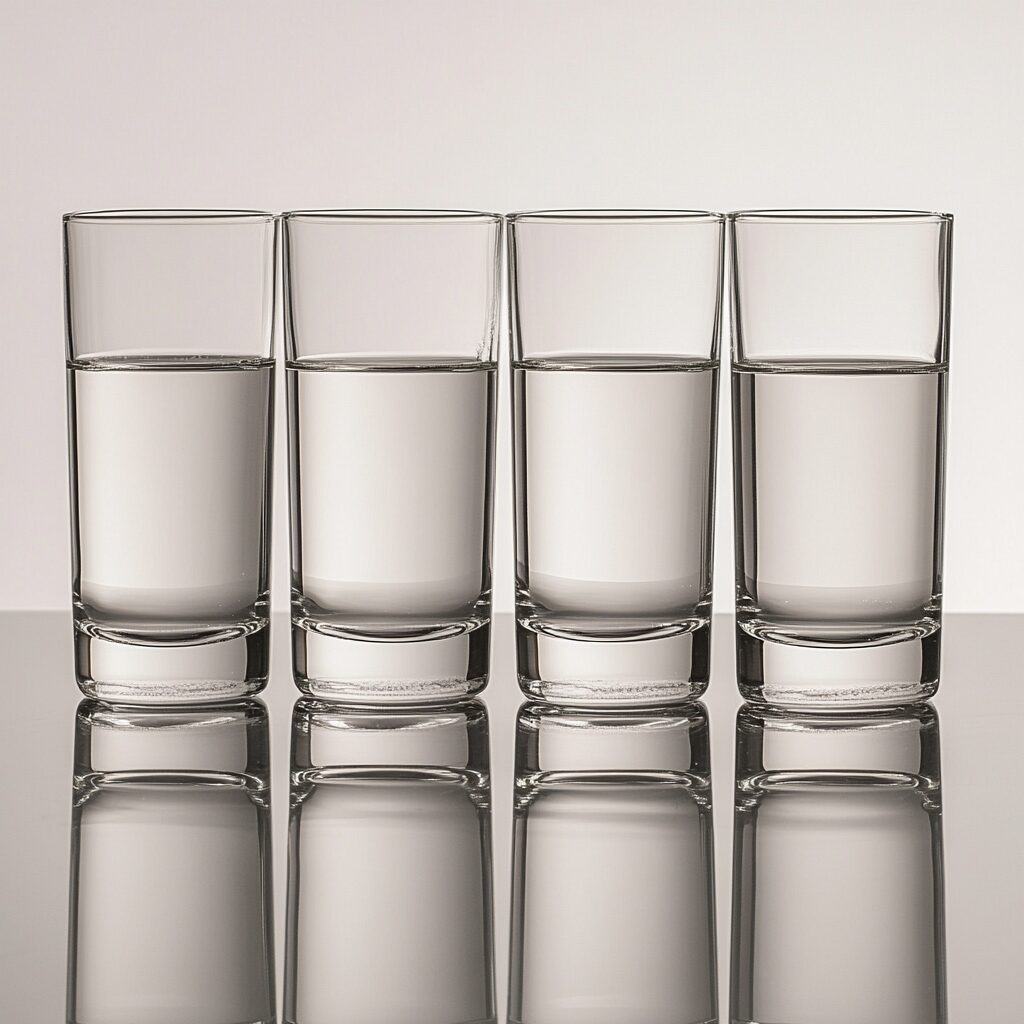Your body is about 60% water.
The body constantly loses water throughout the day, mainly through urine and sweat, but also from regular body functions like breathing. To prevent dehydration, you must get plenty of water from drinking and eating daily.
Experts have conflicting opinions on how much water you should drink daily.
Health experts used to recommend eight 8-ounce glasses, which equals about 2 litres, or half a gallon a day. This is called the 8×8 rule and is very easy to remember.
But, some experts now believe you need to sip on water constantly throughout the day, even when you’re not thirsty.
As with most things, this depends on the individual. Many factors (both internal and external) ultimately affect how much water you need.
This article takes a look at some intake studies to separate fact from fiction, and explains how to easily stay well hydrated for your individual needs.
Table of Contents
How much water do you need?
How much water you need depends on a lot of things and varies from person to person. For adults, the general recommendation is about:
- 11.5 cups (2.7 litres) a day for women
- 15.5 cups (3.7 litres) a day for men
This includes fluids from water, beverages like teas and juice, and from food. You get an average of 20 percent of your water from the foods you eat.

You might need more than someone else. How much you need also depends on:
- Where you live: You will need more in hot, humid, or dry areas. You’ll also need more if you live in the mountains or at a high altitude.
- Your diet: If you drink a lot of coffee and other caffeinated beverages, you might lose more through extra urination. You may also need to drink more water if your diet is high in salty, spicy, or sugary foods. Or, more water is necessary if you don’t eat a lot of hydrating foods like fresh or cooked fruits and vegetables.
- The temperature or season: You may need more in warmer months than cooler ones due to perspiration.
- Your environment: If you spend more time outdoors in the sun or hot temperatures or in a heated room, you might feel thirstier faster.
- How active you are: If you are active during the day or walk or stand a lot, you’ll need more than someone who’s sitting at a desk. If you exercise or do any intense activity, you will need to drink more to cover loss.
- Your health: If you have an infection or a fever, or if you lose fluids through vomiting or diarrhea, you will need to drink more water. If you have a health condition like diabetes you will also need more water. Some medications like diuretics can also make you lose water.
- Pregnant or breastfeeding: if you’re pregnant or nursing your baby, you’ll need to drink extra water to stay hydrated. Your body is doing the work for two (or more.)

Does water intake affect energy levels and brain function?
- Many people claim that if you don’t stay hydrated throughout the day, your energy levels and brain function start to suffer.
- One older study in females showed that a fluid loss of 1.36 percent after exercise impaired mood and concentration and increased the frequency of headaches.
- A more recent study in China that followed 12 male university students found that not drinking for 36 hours had noticeable effects on fatigue, attention and focus, reaction speed, and short-term memory.
- Even mild dehydration can reduce physical performance. Dehydration occurs when your body loses more than you consume and can cause symptoms including fatigue and headache. A clinical study on older, healthy men reported that just a 1 percent loss of body water reduced their muscle strength, power, and endurance.
- Losing 1 percent of body weight might not seem like a lot, but it’s a significant amount to lose. This usually happens when you’re sweating a lot or in a very warm room and not hydrating enough water.

Does drinking a lot of water help you lose weight?
- There are many claims that drinking more may reduce body weight by increasing your metabolism and curbing your appetite.
- According to research, drinking more water than usual correlated to a decrease in body weight and body composition scores.
- Another review of studies found that chronic dehydration was associated with obesity, diabetes, cancer, and cardiovascular disease
- Researchers in another older study estimated that drinking 68 ounces (2 litres) in one day increased energy expenditure by about 23 calories per day due to a thermogenic response, or faster metabolism. The amount was incremental but could add up over time
- Drinking about a half hour before meals can also reduce the number of calories you end up consuming. This might happen because it’s easy for the body to mistake thirst for hunger
- One 2010 study in middle age and older adults showed that people who drank 17 ounces (500 ml) before each meal lost 44% more weight over 12 weeks, compared to those who didn’t. A more recent study in young men showed that people who drank about 19 ounces (568 ml) of water before each meal reduced the amount that the participants needed to eat during the meal to feel sated
- Overall, it seems that drinking adequate amounts of water, particularly before meals, may give you a boost in managing appetite and maintaining a moderate body weight, especially when combined with a balanced eating plan.
- What’s more, drinking plenty of water has a number of other health benefits.

How much should you drink based on your weight and age?
Experts recommend drinking enough so that your urine is pale yellow. The specific amount may vary by more than these factors, so there isn’t a hard-and-fast rule. In some cases, such as if you are sweating or have certain health conditions, you may need to drink more water than you would need otherwise.
Is 8 cups (64 ounces) a day enough?
Despite the popularity of the 8 glasses of as a day rule, in most cases, you need more than 8 cups daily to maintain your balance. Males typically need about 15.5 cups (124 ounces) while females typically need 11.5 cups (92 ounces) of water per day. But this can also include intake from other sources, such as fruit.
Is it too much to drink a gallon a day?
The recommended daily intake for males is slightly less than a gallon. For females, it is a little over 4 cups less. Your individual water needs may be greater than the recommendation, depending on the temperature, your activity level, and whether you are pregnant or breastfeeding, among other factors.
The boom line at the end of the day, no one can tell you exactly how much water you need. This depends on many factors.
Try experimenting to see what works best for you. Some people may function better with more water than usual, while for others it only results in more frequent trips to the bathroom.
If you want to keep things simple, these guidelines should apply to the majority of people:
- Drink often enough throughout the day for clear, pale urine.
- When you’re thirsty, drink.
- During high heat and exercise and other mentioned indications, make sure to drink enough to compensate for the lost or extra needed fluids.
- That’s it!
